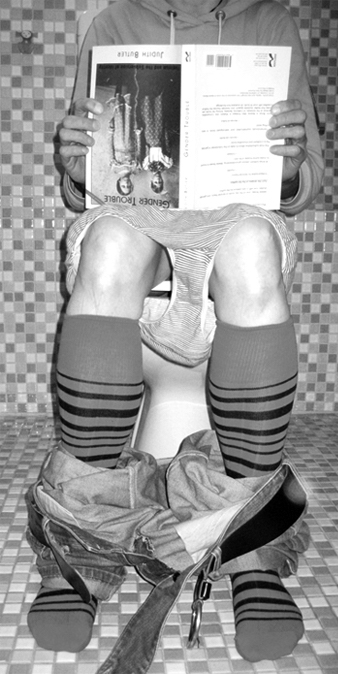Collaborating is a basic mode of living and of co-acting within artistic processes on equal terms. It addresses shared and distributed creativity and inclusion. But it also means working across difference and changing while collaborating with and in between species, as Anna Tsing highlights. Collaborating is therefore a common acting on, also a form of networked acting (Ghanbari/Otto) creates also interference by interacting (Bennett). The commons as practice of experimenting within and across fields, environments and social and economic relations is close to the idea of a concept and its becoming, as examined in Deleuze/ Guattari’s reflection on philosophy. While connecting and linking to other concepts, a field of redistribution opens up between agents and locations. These social spaces of the commons unveil a collective praxis (Casarino/Negri), but also provoke reactions such as affects, critique, consent, protests and (non)places of the undercommons (Harney/Moten).
Thus, the potentiality of acting and acted on as it was described by Aristotle is inherent in matter, as Karen Barad puts it, also as doings in matters of practice and intra-activity beyond representation. In the seminar, we will explore the human and post-human condition of collaboration and collective action within and across materials. We also think about in which way collective experience in political, social, and artistic contexts mobilizes action and how collaborative and collective modes affect artistic creation and production. Within the seminar we would also explore different spaces for collaborative and material encounters, of peripheries and centers and experience within a workshop different forms of reflection and action.
- Trainer/in: Lilian Haberer
- Trainer/in: Johanna Pigors
Hauntings, flashbacks, and the unresolved violence of a past that seems impossible to overcome often lead to archives and collections. In this seminar, we will center art-based research, literature, and performance as a way of interrogating archival spaces and, by doing so, negotiating archival logics. Using examples of artworks that foster an examination of archival structures and the material and immaterial traces within, we will turn to practices that stay open and receptive to the voids, frictions, and the ambivalence, to the things that we might never be able to know but that still matter. Furthermore, the seminar is interested in looking at artists that construct alternative archives through their practice.
Questioning positions and privileges, we are allowed to inhabit in this world is an integral part of the seminar. Be open and prepared to reading and to cherishing the practice of diving into texts, sometimes by reading in silence, sometimes aloud and with each other to start communication and dialogue. The seminar is bilingual (German/English). It will be facilitated at KHM or online, depending on the overall situation.
- Trainer/in: Dilara Raika Er
- Trainer/in: Belinda Kazeem-Kaminski
In an attempt to think about the afterlives of enslavement and colonialism, and the ways in which they shape Blackness in the Diaspora, the seminar Black Feminist Genealogies: Some Seminal Texts turns to the writings of theorists and thinkers like Hortense Spillers, Saidiya Hartman, Grada Kilomba, and Christina Sharpe. By centering Black feminist thought and practice, and turning to the written/the sonic/the visual, we will engage with concepts and vocabularies that help us think the past in the present, the libidinal economy and the gratuitous violence that is continuously being generated, and, most of all, a critique of the “human” as we have come to know it.
Questioning positions and privileges, we are allowed to inhabit in this world is an integral part of the seminar. Be open and prepared to reading and to cherishing the practice of diving into texts, sometimes by reading in silence, sometimes aloud and with each other to start communication and dialogue. We will also be engaging with various artistic practices, and take inspiration from literature, music, and visual art. The seminar is bilingual (German/ English). It will be facilitated at KHM or online, depending on the overall situation.
- Trainer/in: Dilara Raika Er
- Trainer/in: Belinda Kazeem-Kaminski
- Trainer/in: Johanna Pigors

Queer theory is often considered hard to translate and sometimes even discussed as hard to read for its supposedly cryptic language. On the other hand, Deutsch ist auch manchmal sehr schwer. In the seminar, we will try to find ways to access key texts and concepts of queer theory in German, even if we still struggle with longer German texts. Dabei werden wir versuchen, uns Begriffe und Konzepte gemeinsam zu erarbeiten und zu übersetzen. Basis for the seminar will be practices of collaborative translation and interpretation.
This will be an experimental space. Ein Experiment mit Sprache und queerer Theorie. This seminar will not be a language course and neither a traditional introduction to Queer Theory. Das Seminar soll weder ein Sprachkurs, noch eine klassischer Einführungskurs in die Queer Theory sein. Instead, it is an attempt to create a space for queer practices of study. Stattdessen soll es ein Raum zum gemeinsamen queeren studieren werden. Celebrating language trouble and troubling languages, »staying with the trouble« as Donna Haraway puts it.
- Trainer/in: Katrin Kämpf
Das Jahr 2021 markiert im popkulturellen bzw. popmusikalischen Kontext das 40. „Jubiläum“ des Phänomens Hardcore im Kontext der Punkbewegung. Mit Veröffentlichung des Albums Hardcore ’81 der kanadischen Punkband D.O.A. und einem ebenso betitelten Konzert in Vancouver (mit den Bands D.O.A., Black Flag und 7 Seconds) wurde im Jahr 1981 Hardcore erstmals als begriffliche Spezifizierung für eine besonders radikale, extreme und „harte“ Version von Punk etabliert, die bis heute international einflussreich ist.
Wir nehmen dieses „Jubiläum“ zum Anlass, um der Begriffsgeschichte von Hardcore – auch über die Entwicklungen innerhalb von Punkszenen hinaus – nachzugehen und auf die letzten 40 Jahre zurückzublicken. Von Hardcore Punk über Hardcore Rap und Hardcore Techno bis zu Hardcore Gaming und Hardcore Porn betrachten wir anhand von exemplarischen (kultur- und medien-) wissenschaftlichen Studien, was sich für unterschiedliche Bedeutungen und Praxen hinter dem Begriff Hardcore verbergen und wie wir uns diesen analytisch-kritisch nähern können (nicht zuletzt im Hinblick auf eigenes wissenschaftliches Arbeiten/Schreiben sowie eigene künstlerische Projekte).Voraussetzung für die Teilnahme ist die Bereitschaft zu intensiver Textlektüre (deutsch und englisch).
Auswahl aus der Lektüreliste:
− Belsito, Peter und Bob Davis (Hrsg). Hardcore California: A History of Punk and New Wave (1983).
− Calmbach, Marc. More than Music: Einblicke in die Jugendkultur Hardcore (2007).
− Cody, Gabrielle H. (Hrsg) und Annie Sprinkle. Hardcore from the Heart: The Pleasures, Profits And Politics of Sex in Performance (2006)
− Duncombe, Stephen und Maxwell Tremblay (Hrsg). White Riot: Punk Rock and the Politics of Race (2011).
− Ensminger, David A. Visual Vitriol: The Street Art and Subcultures of the Punk and Hardcore Generation (2011).
− Nault, Curran. Queercore: Queer Punk Media Subculture (2018).
− Schulz, Marion. Hardcore & Gender: Soziologische Einblicke in eine globale Subkultur (2014).
− Traber, Daniel S. Whiteness, Otherness and the Individualism Paradox from Huck to Punk (2007).
− Widlack, Katharina. Queer Feminist Punk: An Anti-Social History (2015).
− Williams, Linda. Hard Core: Power, Pleasure, and the Frenzy of the Visible (1989).
- Trainer/in: Konstantin Butz
- Trainer/in: Johanna Pigors
- Trainer/in: Alina Herbing
- Trainer/in: Johanna Pigors
- Trainer/in: Juliana Kalnay
- Trainer/in: Johanna Pigors
